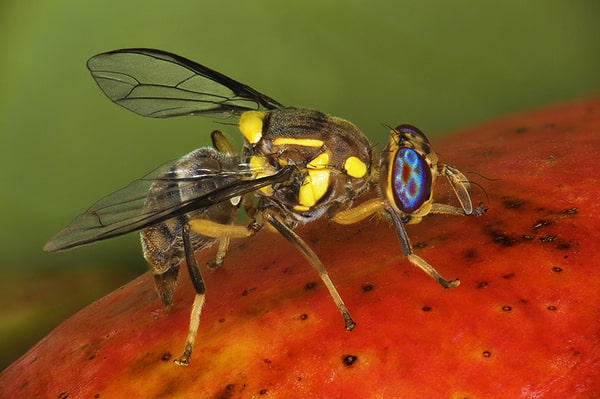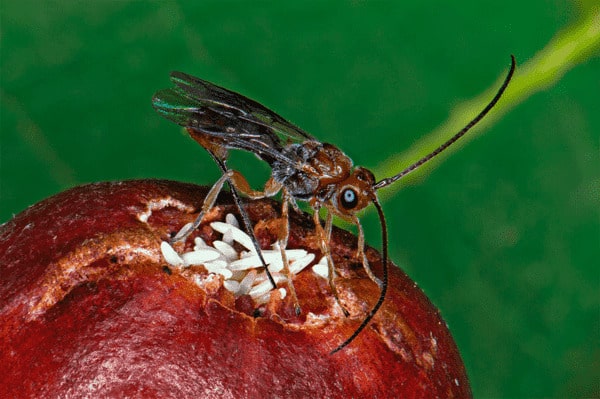Biological Control: the Agroecological Response to Phytosanitary Challenges in the Indian Ocean
Last update: 31 January 2024
Summary
Fruit flies: a threat to agriculture
Biological control : a sustainable solution
Agroecology is not just a trend, but a necessity to ensure the sustainability of our agricultural systems in the face of current environmental challenges. At the heart of this approach lies biological control, a method that aims to control pests using their natural predators, rather than relying on chemical products. In the southwest Indian Ocean, a region rich in biodiversity but also facing many phytosanitary problems, biological control is of crucial importance. Islands such as Réunion and the Comoros are facing an invasion of pests, such as fruit flies, and are seeking sustainable solutions to protect their crops while preserving the balance of their ecosystems. This article aims to explore the initiatives and successes of biological control in this region, highlighting the advantages of this approach for environmentally friendly agriculture.
Fruit flies : a threat to agriculture
Fruit flies are a major threat to agriculture, particularly in the tropical and subtropical regions of the southwest Indian Ocean. They are attracted to the sweet nectar of fruit and lay their eggs inside the fruit, causing visible damage and internal decomposition.
The Invasion of Bactrocera dorsalis
Bactrocera dorsalis was first detected in Réunion in 2017. It has been present in the Comoros since 2005. The rapid spread of this species has been facilitated by inter-island exchanges, making eradication efforts even more challenging. Bactrocera dorsalis is a species of fruit fly that is particularly feared due to its ability to attack a wide range of fruits, including mangoes, citrus fruits, guavas, and cucurbits.
Impact on Local Agriculture
The introduction of new fruit fly species, particularly polyphagous ones such as Bactrocera dorsalis, can cause severe damage to local agriculture. Fruits that are infested become unsuitable for consumption and marketing, resulting in significant economic losses for farmers. Additionally, the existence of these pests can result in export restrictions, which restrict access to international markets.
The Challenges of Management
Controlling fruit fly populations is a major challenge. Traditional methods, such as the use of insecticides, can have harmful effects on the environment and human health. In addition, these pests often develop resistance to chemicals, making these methods increasingly ineffective. Therefore, biological control offers a promising alternative.
Biological Control : a sustainable solution
Biological control is an innovative and environmentally friendly response to the challenges posed by fruit flies and other pests. It is a sustainable solution that avoids the use of harmful chemicals. This method relies on the natural balance of ecosystems to regulate pest populations, instead of relying on chemical products.
What is Biological Control?
Biological control utilises living organisms, such as insects, fungi, or bacteria, to manage or eradicate pests. These 'biological control agents' are either naturally occurring in the environment or introduced after thorough study to ensure they do not disrupt the ecosystem's balance.
The Micro-Wasp Fopius arisanus: A Valuable Ally
In the southwest Indian Ocean, a concrete example of biological control is the use of the micro-wasp Fopius arisanus. This small parasitoid lays its eggs inside the larvae of fruit flies. Once hatched, the young parasitoids consume the larva from the inside, preventing the fly from developing. This method has proven to be particularly effective against Bactrocera dorsalis.
The Advantages of Biological Control
Biological control offers many advantages in addition to its effectiveness. It reduces dependence on insecticides, thus protecting the health of farmers and consumers while preserving biodiversity. Furthermore, it is often more economical in the long term, as biological control agents continue to control pests without human intervention.
Towards More Resilient Agriculture
By adopting biological control, farmers in the southwest Indian Ocean can enhance the resilience of their agricultural systems against phytosanitary challenges. This approach, when combined with other agroecological practices, can lead to more sustainable and environmentally friendly agriculture.
Various local initiatives to adress issues related to plant protection
In the southwest Indian Ocean, various local initiatives have been implemented to address issues related to pests and plant protection. These projects, which are often carried out collaboratively, aim to develop and promote biological control methods that are suitable for the region.
Regional Collaboration for an Effective Approach
Collaboration among Indian Ocean islands is crucial in addressing phytosanitary challenges. Projects such as EpiBio-OI facilitate the exchange of information and best practices among regional experts, enabling the development of common strategies to combat pests and protect biodiversity.
Awareness and Training
In addition to research, it is crucial to raise awareness among farmers and the general public. Regularly organized workshops, training, and information campaigns promote the benefits of biological control and encourage its adoption. These initiatives aim to strengthen farmers' capacities and equip them with the necessary tools to face phytosanitary challenges.In addition to research, it is crucial to raise awareness among farmers and the general public.
Towards Greener Agriculture
Thanks to local initiatives, agriculture in the southwest Indian Ocean is becoming greener and more sustainable. The transition towards environmentally friendly and human health-conscious agriculture is centered around plant protection and the promotion of biological control.
Challenges and Perspectives
Although biological control holds great promise for the future of agriculture in the southwest Indian Ocean, it is not without its challenges. Successful implementation of this approach requires a thorough understanding of local ecosystems, as well as close collaboration between researchers, farmers, and policymakers.
Obstacles to Implementation
Biological control presents a significant challenge due to the need for constant research. Tailored solutions are required for each pest, crop, and ecosystem due to their unique characteristics. Additionally, the introduction of biological control agents must be approached with caution to prevent unintended consequences on the environment.
Importance of Prevention
Prevention is crucial to avoid the introduction of new pests. Quarantine measures, regular inspections, and monitoring are essential to quickly detect any threat and intervene before it becomes a major problem.
Regional and International Collaboration
Collaboration among Indian Ocean islands and other regions of the world is essential to share knowledge and best practices in combating phytosanitary challenges. A coordinated approach is necessary as these challenges know no borders.
Towards a New Era of Biocontrol
The AttracTIS project was launched in 2023 with the aim of developing biocontrol tools against Bactrocera dorsalis in Réunion. The project aims to test the Sterile Insect Technique (SIT) in combination with innovative trapping methods. This initiative is environmentally friendly and integrates with the concept of Agroecological Crop Protection (PAEC). It represents a significant advancement in biological control in Réunion and Mayotte.
AttracTIS is an innovative biocontrol project that aims to test the effectiveness of the Sterile Insect Technique (SIT) as a new lever against the Oriental fruit fly, Bactrocera dorsalis. This species was detected in Réunion in 2017 and has caused significant damage to mangoes, resulting in an increase in the use of phytosanitary products.
Project Objectives - The main objective is to model and predict the technical and ecological feasibility of SIT, combined with compatible control methods. The study will also investigate new attractive volatile substances to reduce B. dorsalis populations. This technique is environmentally friendly and integrates with the concept of Agroecological Crop Protection (PAEC).
SIT Method - The SIT method involves mass-rearing and sterilizing a pest through radiation. Subsequently, sterile males are released, which mate with wild females without producing offspring. This leads to a decrease in the pest population. SIT has many advantages, including targeting only the species to be combated and allowing for the phasing out of phytosanitary products.
Perspectives - AttracTIS represents a significant advancement in biological control in Réunion and Mayotte. By combining SIT with other control methods, such as the use of specific attractants, it provides an innovative and eco-friendly solution for controlling B. dorsalis populations.
Towards a Sustainable Future
Despite the challenges, biological control shows promise in the southwest Indian Ocean. With ongoing research, collaboration, and a commitment to sustainable agriculture, the region is well-positioned to face phytosanitary challenges.
In conclusion, biological control is a promising aspect of agroecology and offers a path for the future of agriculture in the southwest Indian Ocean. To address the growing phytosanitary challenges and protect biodiversity, it is crucial to adopt effective and environmentally friendly methods.
Local initiatives, ongoing research, and regional collaboration have established the groundwork for transitioning to greener and more sustainable agriculture. However, the success of this transition will depend on the collective will of all concerned actors, including farmers, researchers, policymakers, and the general public.
Ultimately, the protection of our ecosystems, the health of our communities, and the prosperity of our agriculture depend on our ability to embrace agroecology and promote biological control as a viable solution for the future.
Author: Isabelle Mialet-Serra (Cirad)
Last update: 31 January 2024


